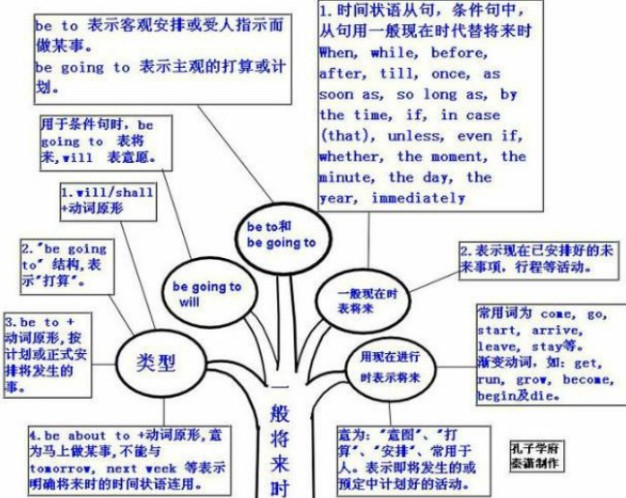本试题 “— I _____ James this evening and ask her to come to my party.— Don't phone her between 6 and 7 o'clock. She _____ a bath.A. am about to call; will ...” 主要考查您对一般将来时
将来进行时
等考点的理解。关于这些考点您可以点击下面的选项卡查看详细档案。
- 一般将来时
- 将来进行时
一般将来时的概念:
一般将来时表示将来某一时刻的发生动作或状态,或将来某一段时间内经常的动作或状态。常与表示将来的时间状语连用。
一般将来时用法:
1)shall用于第一人称,常被will所代替。will在陈述句中用于各人称,在征求意见时常用于第二人称。
例如:Which paragraph shall I read first?我先读哪一段呢?
Will you be at home at seven this evening? 今晚七点回家好吗?
2)be going to+不定式,表示将来。
a. 主语的意图,即将做某事。
例如:What are you going to do tomorrow? 明天打算作什么呢?
b. 计划,安排要发生的事。
例如:The play is going to be produced next month。这出戏下月开播。
c. 有迹象要发生的事。
例如:Look at the dark clouds, there is going to be a storm. 看那乌云,快要下雨了。
3)be+不定式表将来,按计划或正式安排将发生的事。
例如:We are to discuss the report next Saturday. 我们下星期六讨论这份报告。
4)be about to+不定式,意为马上做某事。
例如:He is about to leave for Beijing. 他马上要去北京。
注意:be about to do不能与tomorrow, next week 等表示明确将来时的时间状语连用。
一般将来时知识体系:

一般现在时表将来:
1)下列动词come, go, arrive, leave, start, begin, return的一般现在时可以表示将来,主要用来表示在时间上已确定或安排好的事情。
例如:The train leaves a tsix tomorrow morning. 火车明天上午六点开。
—When does the bus star? 汽车什么时候开?
—It stars in ten minutes. ?十分钟后。
2)以here, there等开始的倒装句,表示动作正在进行。
例如:Here comes the bus.=The bus is coming. 车来了。
There goes the bell.=The bell is ringing. 铃响了。
3)在时间或条件句中。
例如:When Bill comes(不是will come), ask him to wait for me. 比尔来后,让他等我。
I'll write to you as soon as I arrive there. 我到了那里,就写信给你。
4)在动词hope, take carethat,makesurethat等的宾语从句中。
例如:I hope they have a nice time next week. 我希望他们下星期玩得开心。
Make sure that the windows are closed before you leave the room. 离开房间前,务必把窗户关了。
现在进行时表示将来:
下列动词come, go, arrive, leave, start, begin, return等现在进行时可以表示将来。
例如:I'm leaving tomorrow. 明天我要走了。
Are you staying here till next week? 你会在这儿呆到下周吗?
将来进行时的概念:
表示将来某时进行的状态或动作,或按预测将来会发生的事情。
例如:She'll becoming soon. 她会很快来的。
I'l lbe meeting him sometime in the future. 将来我一定去见他。
将来进行时的基本用法:
1、将来进行时表示将来某一时间正在进行的动作:
如:Don't phone me between 5 and 6. We'll be having dinner then. 五点至六点之间不要给我打电话,那时我们在吃饭。
When I get home, my wife will probably be watching television. 当我到家时,我太太可能正在看电视。
2、表示按计划或安排要发生的动作:
如:I will be seeing you next week. 我下个星期来看你。
I'll be taking my holidays soon. 不久我将度假了。
We shall be going to London next week.下周我们要去伦敦。
3、将来进行时表示委婉语气:
如:Will you be having some tea? 喝点茶吧。
Will you be needing anything else? 你还需要什么吗?
将来进行时与一般将来时的区别:
(1)两者基本用法不一样:
将来进行时表示将来某时正在进行的动作,一般将来时表示将来某时将要发生的动作:
如:What will you be doing this time tomorrow? 明天这个时候你会在做什么呢?
What will you do tomorrow? 你明天干什么?
(2)两者均可表示将来,但用将来进行时语气更委婉:
如:When will you finish these letters? 你什么什候处理完这些信件?(直接询问,如上司对下属)
When will you be seeing Mr White? 你什么时候见怀特先生?(委婉地询问,如下属对上司)
When will you pay back the money?你什么时候还钱?(似乎在直接讨债)
When will you be paying back the money? 这钱你什么时候还呢?(委婉地商量)
(3)有时一般将来中的will含有“愿意”的意思,而用将来进行时则只是单纯地谈未来情况:
如:Mary won't pay this bill. 玛丽不肯付这笔钱。(表意愿)
Mary won't be paying this bill. 不会由玛丽来付钱。(单纯谈未来情况)
与“— I _____ James this evening and ask her to come to my pa...”考查相似的试题有:
- The woman will think of her own child ______ she ______ these little children.A.every time;seesB.each time;will s...
- John sold the camera yesterday which his brother him as a birthday present from Japan.A.has sentB.had sentC.was se...
- Please don’t make so much noise.I a novel.A.writesB.am writingC.wroteD.was writing
- — Remember the trip? The scenery there is really breathing-taking. —Yeah. We also really a good time.A.haveB.have h...
- By the time these books were published, he _____ addicted to them.A.had becomeB.becomesC.has becomeD.became
- —You must have met him the other day. —Oh, no, I ________ .A.hadn’tB.mustn’tC.haven’tD.didn’t
- It's reported that by the end of this week the stock exchange________ by about 10%.A.will have risenB.has risenC....
- —I’d like a pen which _________ well.—Will this one _________?A.is written;workB.writes; workC.is written; doD.w...
- Johnson would have faced the music but he ______ doing things like that.A.had stoppedB.stoppedC.was stoppingD.has...
- I first met John at my sister’s wedding. He _________ with the bridegroom at the time.A.was talkingB.talkedC.had t...